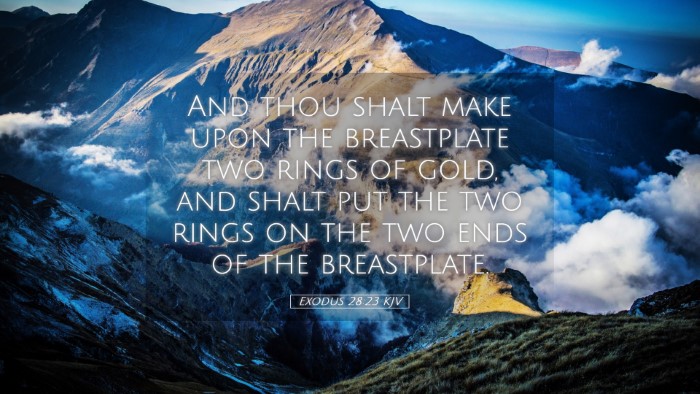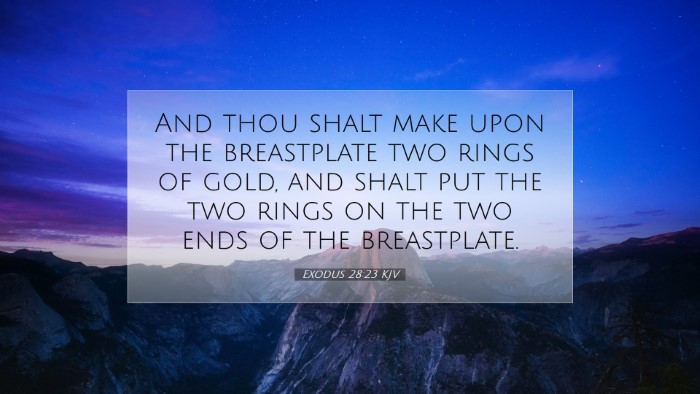Commentary on Exodus 28:23
Verse: "And thou shalt make upon the breastplate of judgment, the jewels of remembrance to bring up the judgment of the children of Israel; and it shall be on Aaron's heart before the Lord continually." (Exodus 28:23)
Introduction
The verse Exodus 28:23 is instrumental in understanding the significance of the high priest's garments, particularly the breastplate of judgment, which is intricately designed to represent the people of Israel before God. This commentary synthesizes insights from several public domain commentaries, providing depth and clarity for pastors, students, and scholars.
The Breastplate of Judgment
Significance of the Breastplate: The breastplate of judgment serves not only as a decorative piece but as a crucial instrument in the priestly duties of Aaron. Similar to the Urim and Thummim, this breastplate is imbued with spiritual significance, symbolizing the weight of the decisions he carries on behalf of the people of Israel.
Insights from Matthew Henry
According to Matthew Henry, the breastplate is made of precious stones, each representing one of the tribes of Israel. This signifies that Aaron, as high priest, bears the names of the tribes close to his heart, emphasizing intercession. He notes the phrase "before the Lord continually," highlighting the perpetual nature of intercession and the intimate relationship between God, the high priest, and the people.
Insights from Albert Barnes
Albert Barnes expands on the rich symbolism of the breastplate, indicating that it serves as a reminder of the covenant between God and Israel. Each stone represents a tribe, denoting the unity and diversity of the people of God. Barnes emphasizes that the heart is central in this context, suggesting that decisions made on behalf of the people are deeply rooted in heartfelt devotion and an understanding of their needs.
Insights from Adam Clarke
Adam Clarke delves into the specifics of the stones chosen for the breastplate, elucidating their significance in ancient culture. He asserts that the high priest must always consider the various needs and challenges faced by the tribes. Clarke posits that the connection to the heart signifies the necessity of love and compassion in spiritual leadership, underlining that Aaron's actions are motivated by a genuine concern for the welfare of Israel.
Theological Implications
The design of the breastplate engenders theological reflection on the mediatorial role of Christ, the ultimate High Priest. Just as Aaron carried the names of the tribes on his heart, so Christ carries the names of His people before the Father. This draws attention to the continuity of God’s redemptive plan through the ages.
- Intercession: The high priest's role as an intercessor reflects the broader theme of mediation in Scripture. This carries through to the New Testament, where Jesus stands as the perfect mediator.
- The Heart and Leadership: The emphasis on the heart suggests that true leadership in spiritual matters must be rooted in love and concern for the community.
- Covenantal Relationship: The choice of stones signifies the ongoing relationship and covenant between God and His people, reminding us of the necessity of remembrance and fidelity in our walk with God.
Application for Today
This passage calls modern believers to reflect on their roles within the community of faith. Pastors and leaders are reminded to "carry" their congregations in their hearts, modeling the intercessory spirit of Christ. The call to embody compassion, love, and responsibility in leadership is a poignant takeaway from this verse.
Conclusion
Exodus 28:23 encapsulates essential truths about divine representation and intercession. The high priest’s vestments are not mere ceremonial attire but are rich in meaning, foreshadowing Christ's ongoing work among His people. By understanding this verse through the lenses of prominent biblical commentators, we gain deeper insights into our calling to love and serve others, reflecting God's concern for His people.
In light of these teachings, may we strive to be vessels of His grace and truth in our communities, embodying the love that motivates genuine leadership.


